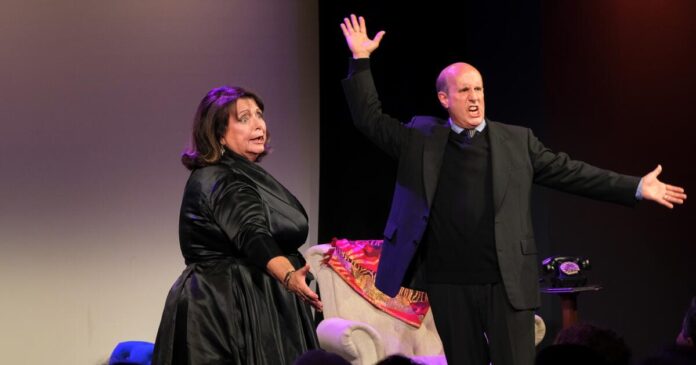Bodhi Tree Concerts presented the San Diego premiere of Ricky Ian Gordon’s “Autumn Valentine” Saturday evening at the UCSD Park & Market.
The new and interesting building provides a valuable multi-use space in downtown’s East Village. Bodhi Tree remains an important cultural enterprise, offering gutsy and imaginative projects, hiring local musicians and donating all proceeds to charity. But the new chamber opera’s libretto and some of the stage direction were disappointing.
Gordon has an extensive resumé, and his work — whose focus is largely on the voice and the stage — has earned numerous prestigious awards.
“Autumn Valentine” is a chamber opera for soprano, baritone, and small ensemble, and takes its libretto from poems and texts by writer and satirist Dorothy Parker, whose wry, sometimes caustic wit helped to articulate the 20th century’s popular zeitgeist. Saturday’s vocalists (listed as collaborators for the project) were the excellent local singers Angelina Réaux, soprano, and Michael Sokol, baritone. Réaux brought a varied, nimble approach to solos and duets, with an impressive upper register and vivid stage characterizations. Sokol has an auburn, handsome timbre, and was in fine form on solos like the elegant and melancholy “Lullaby.”
The two singers are married, and their personal connection was highlighted by their natural and intimate ensemble counterpoint in several duets. The chamber group was especially strong Saturday, led by pianist and conductor Ines Irawati, whose playing was sharp and dramatic. Flutist Pam Martchev and clarinetist Peter Dayeh painted supple lines through the often-thick textures; trombonist Eric Starr added balanced and sculpted weight across registers; cellist Erica Ereni and bassist Adrian Holtz were unified in intonation and articulation, and percussionist Michael Jones moved easily between drum kit and mallet instruments, providing important punctuation to dramatic moments.
Gordon’s music shows a deep understanding of musical theater traditions, from Kurt Weill to the golden era of the American stage. Many of his songs, especially the fine “Lullaby,” are harmonically bold and original. His ability to craft contrapuntal textures that mirror plot complexities is obvious and effective.
But “Autumn Valentine” is an imperfect work whose laudable qualities were overcome Saturday by several problems. To begin with, Parker’s texts do not exactly go gentle into their musical settings. They are stubbornly uniform in rhyme, scansion and the rate and intensity of their humor. Hearing so many of them back to back diminishes, rather than develops, their impact — a bit like a full evening of Yogi Berra aphorisms might. These poems were dutifully glad-handed into musical and dramatic moments that felt flat.
Indeed, the most compelling numbers were those for which Gordon wrote original lyrics, like “Ours” and “Far Away,” which had more interesting phrases and metrical details. Further, the plot, which emerges only through the audience’s intuitive efforts, is a too-familiar mid-century trope in which two generic and ignoble characters bumble first into a passionless marriage, then rush into mutual disappointment, infidelity and an undefined and unredeeming regret.
The clichés are too many to count: he goes off to war, leaving her to spend his money alone and resentful; he becomes a mid-level executive at a rubber company and begins diddling the steno girl, herself an unfortunate nobody. The characters’ discontent seems to be almost biblically pre-determined — familiar, but unexplained and unexplored. The stage direction, too, lacked intent and purpose, with many scenes having the two characters wander aimlessly around a cocktail cart, raising their hands and looking at each other in wordless exasperation.
There came, toward the end, and almost by accident, an opportunity for us to dwell in the sense of a genuine and moving sadness and loss. It was the choking ubiquity of this perplexing postwar ennui, the vague trauma — left mostly to the older members of the audience to recognize — and loneliness that lies at the heart of “Who’s Afraid of Virginia Woolf?” or “Ordinary People,” or countless other stories of American marital disillusion and dissolution.
We could have, and ought to have, ended there. Gordon’s unfortunate choice to end the drama with a bathetic, quasi-vaudeville final reprise left a tawdry effect ringing in the air.
Schulze is a freelance writer.



